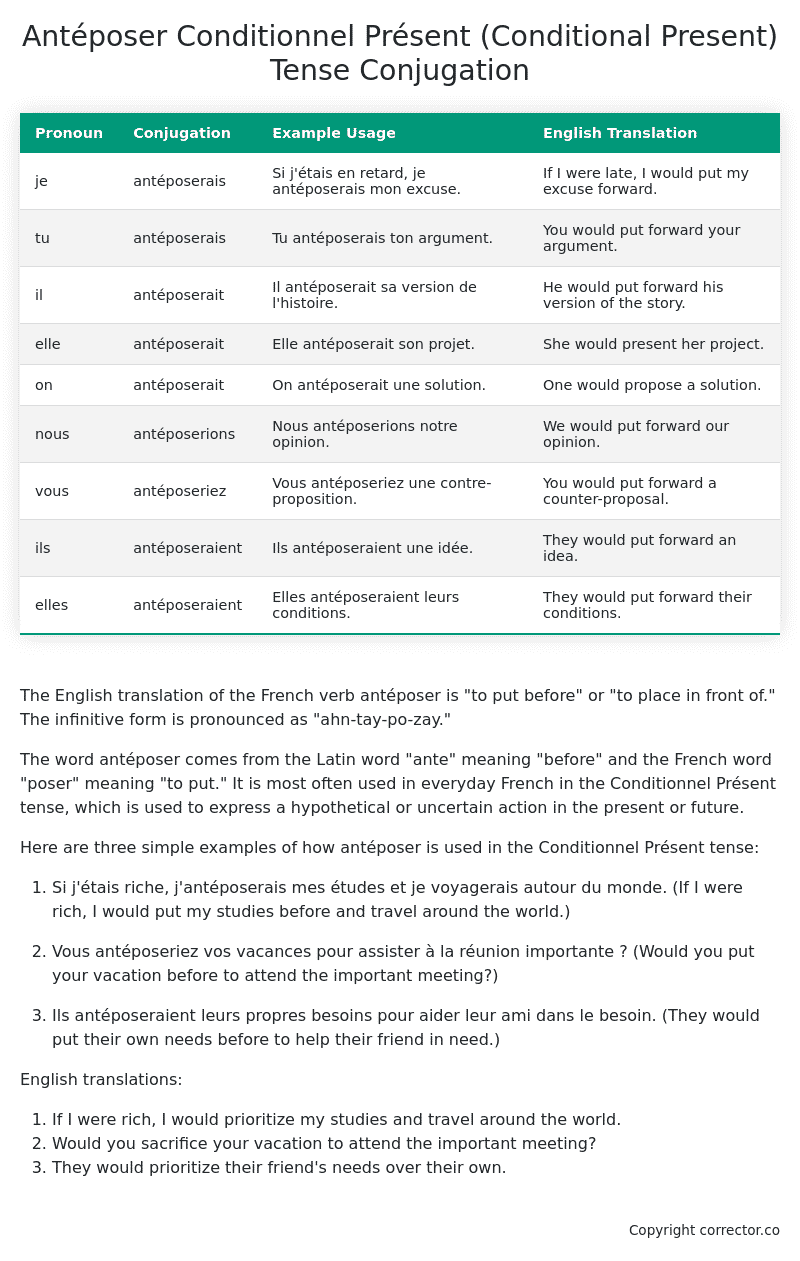Conditionnel Présent (Conditional Present) Tense Conjugation of the French Verb antéposer
Introduction to the verb antéposer
The English translation of the French verb antéposer is “to put before” or “to place in front of.” The infinitive form is pronounced as “ahn-tay-po-zay.”
The word antéposer comes from the Latin word “ante” meaning “before” and the French word “poser” meaning “to put.” It is most often used in everyday French in the Conditionnel Présent tense, which is used to express a hypothetical or uncertain action in the present or future.
Here are three simple examples of how antéposer is used in the Conditionnel Présent tense:
-
Si j’étais riche, j’antéposerais mes études et je voyagerais autour du monde. (If I were rich, I would put my studies before and travel around the world.)
-
Vous antéposeriez vos vacances pour assister à la réunion importante ? (Would you put your vacation before to attend the important meeting?)
-
Ils antéposeraient leurs propres besoins pour aider leur ami dans le besoin. (They would put their own needs before to help their friend in need.)
English translations:
- If I were rich, I would prioritize my studies and travel around the world.
- Would you sacrifice your vacation to attend the important meeting?
- They would prioritize their friend’s needs over their own.
Table of the Conditionnel Présent (Conditional Present) Tense Conjugation of antéposer
| Pronoun | Conjugation | Example Usage | English Translation |
|---|---|---|---|
| je | antéposerais | Si j’étais en retard, je antéposerais mon excuse. | If I were late, I would put my excuse forward. |
| tu | antéposerais | Tu antéposerais ton argument. | You would put forward your argument. |
| il | antéposerait | Il antéposerait sa version de l’histoire. | He would put forward his version of the story. |
| elle | antéposerait | Elle antéposerait son projet. | She would present her project. |
| on | antéposerait | On antéposerait une solution. | One would propose a solution. |
| nous | antéposerions | Nous antéposerions notre opinion. | We would put forward our opinion. |
| vous | antéposeriez | Vous antéposeriez une contre-proposition. | You would put forward a counter-proposal. |
| ils | antéposeraient | Ils antéposeraient une idée. | They would put forward an idea. |
| elles | antéposeraient | Elles antéposeraient leurs conditions. | They would put forward their conditions. |
Other Conjugations for Antéposer.
Le Present (Present Tense) Conjugation of the French Verb antéposer
Imparfait (Imperfect) Tense Conjugation of the French Verb antéposer
Passé Simple (Simple Past) Tense Conjugation of the French Verb antéposer
Passé Composé (Present Perfect) Tense Conjugation of the French Verb antéposer
Futur Simple (Simple Future) Tense Conjugation of the French Verb antéposer
Futur Proche (Near Future) Tense Conjugation of the French Verb antéposer
Plus-que-parfait (Pluperfect) Tense Conjugation of the French Verb antéposer
Passé Antérieur (Past Anterior) Tense Conjugation of the French Verb antéposer
Futur Antérieur (Future Anterior) Tense Conjugation of the French Verb antéposer
Subjonctif Présent (Subjunctive Present) Tense Conjugation of the French Verb antéposer
Subjonctif Passé (Subjunctive Past) Tense Conjugation of the French Verb antéposer
Subjonctif Imparfait (Subjunctive Imperfect) Tense Conjugation of the French Verb antéposer
Subjonctif Plus-que-parfait (Subjunctive Pluperfect) Tense Conjugation of the French Verb antéposer
Conditionnel Présent (Conditional Present) Tense Conjugation of the French Verb antéposer (this article)
Conditionnel Passé (Conditional Past) Tense Conjugation of the French Verb antéposer
L’impératif Présent (Imperative Present) Tense Conjugation of the French Verb antéposer
L’infinitif Présent (Infinitive Present) Tense Conjugation of the French Verb antéposer
Struggling with French verbs or the language in general? Why not use our free French Grammar Checker – no registration required!
Get a FREE Download Study Sheet of this Conjugation 🔥
Simply right click the image below, click “save image” and get your free reference for the antéposer Conditionnel Présent tense conjugation!

Antéposer – About the French Conditionnel Présent (Conditional Present) Tense
Formation
Common Everyday Usage Patterns
Expressing Polite Requests
Expressing Hypothetical Situations
Expressing Doubt or Uncertainty
Interactions with Other Tenses
Present Tense
Past Tense
Future Tense
Conditional Perfect
Summary
Want More?
I hope you enjoyed this article on the verb antéposer. Still in a learning mood? Check out another TOTALLY random French verb conjugation!


